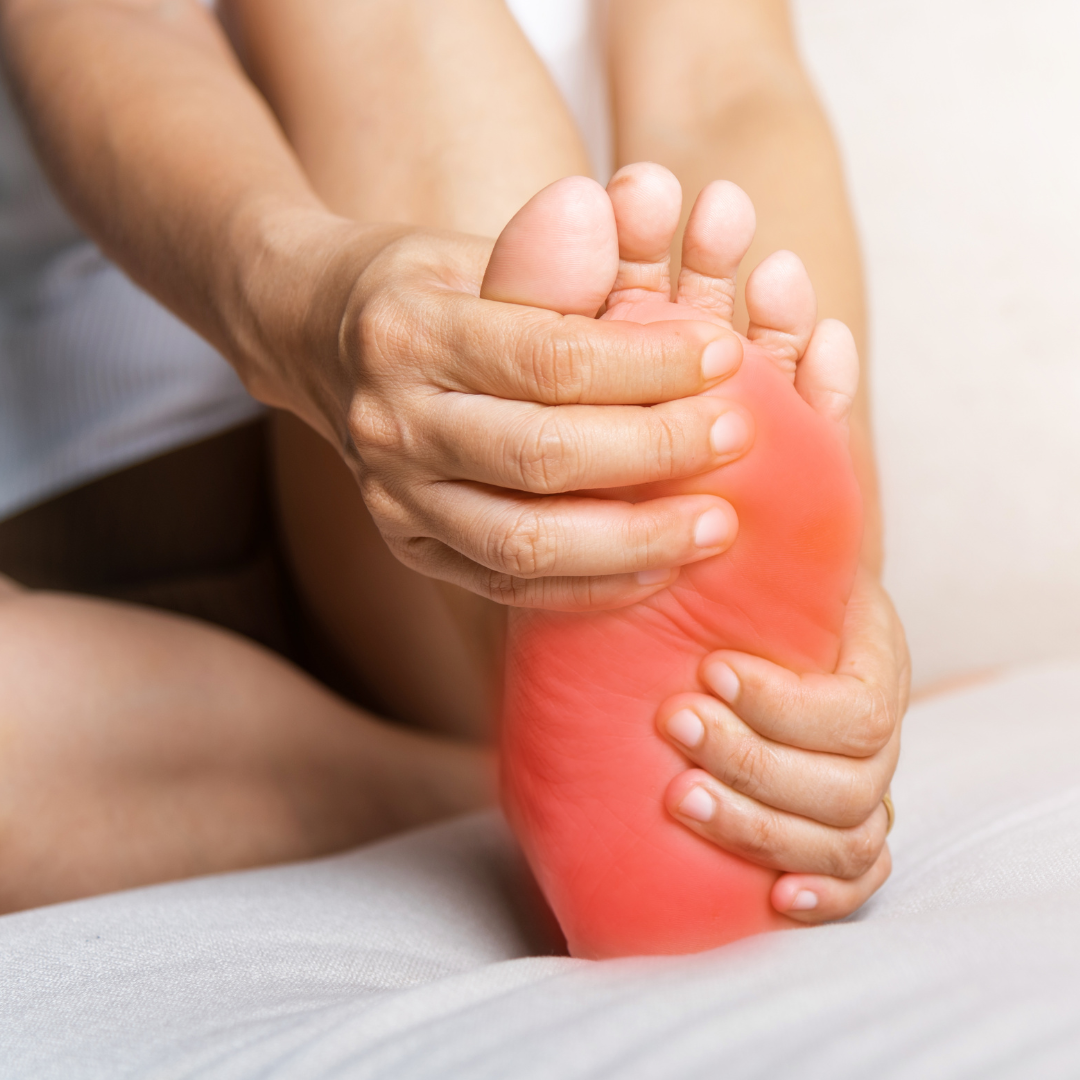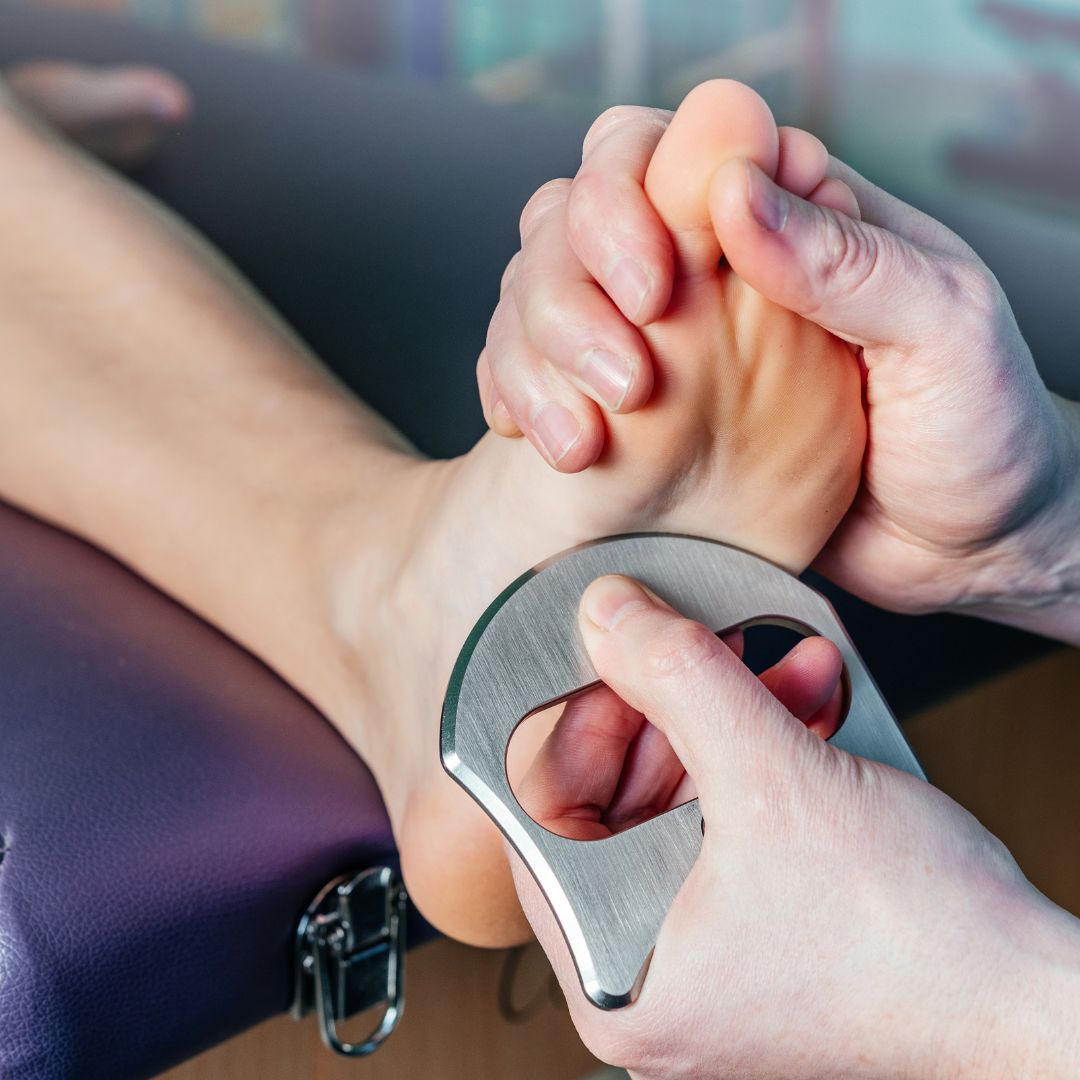Plantar Fasciitis
Understanding Plantar Fasciitis: Causes, Symptoms and Effective Treatments
What is Plantar Fasciitis?
Plantar fasciitis is a common condition characterised by pain and inflammation of the plantar fascia, a thick band of tissue that runs across the bottom of your foot and connects your heel bone to your toes. This condition often results in stabbing pain in the arch or heel, especially with the first steps in the morning. As you move, the pain might decrease but can return after long periods of standing or rising from sitting.
What Causes Plantar Fasciitis?
Several factors can contribute to the development of plantar fasciitis:
Overuse and Repetitive Strain
Repetitive stress on the plantar fascia can cause tiny tears and inflammation. This is often seen in runners, dancers, and people who engage in activities that put a lot of stress on the heel and attached tissue.
Foot & Body Mechanics
Flat feet, a high arch, or an abnormal walking pattern can affect the way weight is distributed when you’re standing and put added stress on the plantar fascia.
Believe it or not, muscle imbalances, weakness or instabilities further up the chain in your body like tight and weak calves, poor gluteal, pelvic or core control can also cause altered loading through your feet and also contribute to plantar fasciitis.
Age
Plantar fasciitis is most common in people between the ages of 40 and 60.


Occupation
Jobs that require long hours of standing or walking on hard surfaces can increase the risk of developing plantar fasciitis. Additionally wearing certain types of footwear like high heels, very flat slip on shoes or work boots can alter the amount of support provided to your feet and change the way you walk, increasing the stress on the plantar fascia.
Carrying Additional Weight
It makes sense that extra body weight puts additional pressure on your plantar fascia, potentially leading to inflammation and pain.
Pregnancy
Did you know we often speak with pregnant women complaining of plantar fasciitis. In addition to weight gain as the baby grows, pregnancy hormones cause the loosening of the ligaments of the feet and swelling both of which can cause inflammation and pain in the plantar fascia.
How to Treat Plantar Fasciitis
Effective treatment of plantar fasciitis often involves a combination of early management to identify and address the causes where possible, physiotherapy treatment and modalities and self-care measures through lifestyle modifications. At Activate Physiotherapy, we emphasise the benefits of physiotherapy and advanced treatment options like Shockwave Therapy.
Stretching and Strengthening Exercises
Physiotherapy plays a crucial role in the treatment of plantar fasciitis. A physiotherapist can develop a personalised exercise program to address your individual factors. For example, you might need to complete stretches for the plantar fascia, calves and Achilles tendon and strengthening exercises for the muscles of the lower leg. These exercises can help stabilise the ankle and heel, reducing stress on the plantar fascia.
Shockwave Therapy
Shockwave Therapy is a non-invasive treatment that uses sound waves to produce a mechanical force that stimulates healing in the affected area. This therapy promotes increased blood flow, accelerates tissue repair, and reduces pain and inflammation. At Activate Physiotherapy, we offer Shockwave Therapy as an effective treatment option for plantar fasciitis, often providing significant relief after just a few sessions (Ibrahim, et al. 2010 & Gerdesmeyer et al. 2008).
Relative Rest and Activity Modification
Reducing or modifying activities that contribute to plantar fasciitis can help alleviate symptoms. Whilst complete rest might be tempting, it is seldom practical and is not beneficial to your long-term recovery. At Activate Physiotherapy we promote active recovery from injury so we recommend identifying and modifying aggravating activities. This may mean walking, riding a bike or swimming instead of running, changing your footwear to something more supportive or reducing prolonged standing or walking on hard surfaces whilst managing your plantar fasciitis.
Orthotics and Supportive Footwear
Wearing supportive shoes with good arch support and cushioned soles can reduce stress on the plantar fascia. In some cases, orthotics prescribed by a physiotherapist or podiatrist may be required to provide additional support and alignment correction.
Pain Management
Over-the-counter pain relievers and anti-inflammatories can help reduce pain and inflammation. Applying ice to the affected area for 15-20 minutes several times a day can also provide relief.
Lifestyle Modifications
Maintaining a healthy weight through diet and exercise can reduce stress on the plantar fascia and prevent the recurrence of the condition.
Night Splints
Night splints are a drug-free, non-invasive management option for Plantar Fasciitis. Wearing a night splint can keep the plantar fascia and Achilles tendon in a stretched position during sleep, which can help reduce morning pain and stiffness.

Conclusion
Plantar fasciitis can be a painful and debilitating condition, but with the right treatment, recovery is possible. At Activate Physiotherapy, we specialise in comprehensive treatment plans tailored to each patient’s needs, including physiotherapy and advanced Shockwave Therapy. If you’re suffering from heel pain or suspect you have plantar fasciitis, book online today to schedule a consultation and take the first step toward pain-free living.
How to Make an Appointment
Making an appointment to see one of our Physiotherapists is as easy as booking online for your nearest Brisbane based Activate Physiotherapy clinic in Stafford or Tingalpa.
